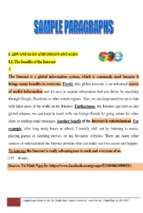Tổng hợ
ợp các bài viế
ết task
2 củ
ủa thầy Simon
Tổng
ng h
hợp bởi:i: Mr. Toan ZIM
About me
Greetings IELTS learners who wish to ace the writing session of the test.
The name is Toan – aka Toan Zim ( 8.0 IELTS ). Welcome to my blog, where
I share free lessons and tips about the Ielts in general, particularly Ielts
writing. And I understand the need for writing materials such as sample
essays from those who prefer “solo studying” at home, so recently I have
collected all of the essays from the ex-examiner
ex examiner Simon who is famous for
his simplicity and accuracy in his writing. I did learn a lot from readi
reading his
samples alone and I know the value of such materials to students of
different levels from beginners to experts. So there you go! Enjoy learning
IELTS
Opinion essays
In some countries, many more people are choosing to live alone nowadays than in
the past. Do you think this is a positive or negative development?
In recent years it has become far more normal for people to live alone, particularly in
large cities in the developed world. In my opinion, this trend could have both positive
and negative consequences in equal measure.
The rise in one-person
person households can be seen as positive for both personal
persona and
broader economic reasons. On an individual level, people who choose to live alone
may become more independent and self-reliant
self reliant than those who live with family
members. A young adult who lives alone, for example, will need to learn to cook,
clean, pay bills and manage his or her budget, all of which are valuable life skills; an
increase in the number of such individuals can certainly be seen as a positive
development. From an economic perspective, the trend towards living alone will
result in greater demand
emand for housing. This is likely to benefit the construction industry,
estate agents and a whole host of other companies that rely on homeowners to buy
their products or services.
However, the personal and economic arguments given above can be considered from
the opposite angle. Firstly, rather than the positive feeling of increased independence,
people who live alone may experience feelings of loneliness, isolation and worry. They
miss out on the emotional support and daily conversation that family or flatmates
fla
can
provide, and they must bear the weight of all household bills and responsibilities; in
this sense, perhaps the trend towards living alone is a negative one. Secondly, from
the financial point of view, a rise in demand for housing is likely to pu
push up property
prices and rents. While this may benefit some businesses, the general population,
including those who live alone, will be faced with rising living costs.
In conclusion, the increase in one-person
one person households will have both beneficial and
detrimental
imental effects on individuals and on the economy.
(306 words-band 9)
Some people who have been in prison become good citizens later, and it is often
argued that these are the best people to talk to teenagers about the dangers of
committing
a
crime.
To what
hat extent do you agree or disagree?
It is true that ex-prisoners
prisoners can become normal, productive members of society. I
completely agree with the idea that allowing such people to speak to teenagers about
their experiences is the best way to discourage them from breaking the law.
In my opinion, teenagers are more likely to accept advice from someone who can
speak from experience. Reformed offenders can tell young people about how they
became involved in crime, the dangers of a criminal lifestyle, and what life
lif in prison is
really like. They can also dispel any ideas that teenagers may have about criminals
leading glamorous lives. While adolescents are often indifferent to the guidance given
by older people, I imagine that most of them would be extremely keen to
t hear the
stories of an ex-offender.
offender. The vivid and perhaps shocking nature of these stories is
likely to have a powerful impact.
The alternatives to using reformed criminals to educate teenagers about crime would
be much less effective. One option would b
be
e for police officers to visit schools and talk
to young people. This could be useful in terms of informing teens about what happens
to lawbreakers when they are caught, but young people are often reluctant to take
advice from figures of authority. A second
second option would be for school teachers to
speak to their students about crime, but I doubt that students would see teachers as
credible sources of information about this topic. Finally, educational films might be
informative, but there would be no opportunity
opportunity for young people to interact and ask
questions.
In conclusion, I fully support the view that people who have turned their lives around
after serving a prison sentence could help to deter teenagers from committing crimes.
(287 words, band 9)
The older generations tend to have very traditional ideas about how people should
live, think and behave. However, some people believe that these ideas are not
helpful
in
preparing
younger
generations
for
modern
life.
To what extent do you agree or disagree with thi
this view?
It is true that many older people believe in traditional values that often seem
incompatible with the needs of younger people. While I agree that some traditional
ideas are outdated, I believe that others are still useful and should not be forgotte
forgotten.
On the one hand, many of the ideas that elderly people have about life are becoming
less relevant for younger people. In the past, for example, people were advised to
learn a profession and find a secure job for life, but today’s workers expect much mor
more
variety and diversity from their careers. At the same time, the ‘rules’ around
relationships are being eroded as young adults make their own choices about who
and when to marry. But perhaps the greatest disparity between the generations can
be seen in their
eir attitudes towards gender roles. The traditional roles of men and
women, as breadwinners and housewives, are no longer accepted as necessary or
appropriate by most younger people.
On the other hand, some traditional views and values are certainly applicable
applic
to the
modern world. For example, older generations attach great importance to working
hard, doing one’s best, and taking pride in one’s work, and these behaviours can surely
benefit young people as they enter today’s competitive job market. Other
characteristics
racteristics that are perhaps seen as traditional are politeness and good manners.
In our globalised world, young adults can expect to come into contact with people
from a huge variety of backgrounds, and it is more important than ever to treat others
with respect. Finally, I believe that young people would lead happier lives if they had a
more ‘old-fashioned’
fashioned’ sense of community and neighbourliness.
In conclusion, although the views of older people may sometimes seem unhelpful in
today’s world, we should not
not dismiss all traditional ideas as irrelevant.
(299 words, band 9)
Wild animals have no place in the 21st century, so protecting them is a waste of
resources. To what extent do you agree or disagree?
Some people argue that it is pointless to spend money on the protection of wild
animals because we humans have no need for them. I completely disagree with this
point of view.
In my opinion, it is absurd to argue that wild animals have no place in the 21st
century. I do not believe that planet Earth exists only for the benefit of humans, and
there is nothing special about this particular century that means that we suddenly
have the right to allow or encourage the extinction of any species. Furthermore, there
is no compelling
mpelling reason why we should let animals die out. We do not need to exploit
or destroy every last square metre of land in order to feed or accommodate the
world’s population. There is plenty of room for us to exist side by side with wild
animals, and this should be our aim.
I also disagree with the idea that protecting animals is a waste of resources. It is usually
the protection of natural habitats that ensures the survival of wild animals, and most
scientists agree that these habitats are also crucial for
for human survival. For example,
rainforests produce oxygen, absorb carbon dioxide and stabilise the Earth’s climate. If
we destroyed these areas, the costs of managing the resulting changes to our planet
would far outweigh the costs of conservation. By protecting
protecting wild animals and their
habitats, we maintain the natural balance of all life on Earth.
In conclusion, we have no right to decide whether or not wild animals should exist,
and I believe that we should do everything we can to protect them.
(269 words, band 9)
Families who send their children to private schools should not be required to pay
taxes
that
support
the
state
education
system.
To what extent do you agree or disagree with this statement?
Some people believe that parents of children who attend private schools should not
need to contribute to state schools through taxes. Personally, I completely disagree
with this view.
For a variety of reasons, it would be wrong to reduce taxes for families who pay for
private education. Firstly, it would be di
difficult
fficult to calculate the correct amount of tax
reduction for these families, and staff would be required to manage this complex
process. Secondly, we all pay a certain amount of tax for public services that we may
not use. For example, most people are fort
fortunate
unate enough not to have to call the police
or fire brigade at any time in their lives, but they would not expect a tax reduction for
this. Finally, if wealthy families were given a tax discount for sending their children to
private schools, we might have a situation where poorer people pay higher taxes than
the rich.
In my opinion, we should all be happy to pay our share of the money that supports
public schools. It is beneficial for all members of society to have a high quality
education system with equal opportunities for all young people. This will result in a
well-educated
educated workforce, and in turn a more productive and prosperous nation.
Parents of children in private schools may also see the advantages of this in their own
lives. For example, a company o
owner
wner will need well qualified and competent staff, and
a well-funded
funded education system can provide such employees.
In conclusion, I do not believe that any financial concessions should be made for
people who choose private education.
(269 words, band 9)
Nowadays
owadays celebrities are more famous for their glamour and wealth than for their
achievements,
and
this
sets
a
bad
example
to
young
people.
To what extent do you agree or disagree with this statement?
It is true that some celebrities are known for their gla
glamorous
morous lifestyles rather than for
the work they do. While I agree that these celebrities set a bad example for children, I
believe that other famous people act as positive role models.
On the one hand, many people do achieve fame without really working for it. They
may have inherited money from parents, married a famous or wealthy person, or they
may have appeared in gossip magazines or on a reality TV programme. A good
example would be Paris Hilton, who is rich and famous for the wrong reasons. She
spends her time attending parties and nightclubs, and her behaviour promotes the
idea that appearance, glamour and media profile are more important than hard work
and good character. The message to young people is that success can be achieved
easily, and that school
ool work is not necessary.
On the other hand, there are at least as many celebrities whose accomplishments
make them excellent role models for young people. Actors, musicians and sports stars
become famous idols because they have worked hard and applied th
themselves to
develop real skills and abilities. They demonstrate great effort, determination and
ambition, which is required for someone who wants to be truly successful in their
chosen field. An example is the actor and martial artist Jackie Chan, who has become
world famous through years of practice and hard work. This kind of self-made
self
celebrity
can inspire children to develop their talents through application and perseverance.
(Add your own conclusion)
When choosing a job, the salary is the most important
important consideration. To what extent
do you agree or disagree?
Many people choose their jobs based on the size of the salary offered. Personally, I
disagree with the idea that money is the key consideration when deciding on a career,
because I believe that other
her factors are equally important.
On the one hand, I agree that money is necessary in order for people to meet their
basic needs. For example, we all need money to pay for housing, food, bills, health
care, and education. Most people consider it a priorit
priorityy to at least earn a salary that
allows them to cover these needs and have a reasonable quality of life. If people chose
their jobs based on enjoyment or other non
non-financial
financial factors, they might find it
difficult to support themselves. Artists and musicians,
musicians, for instance, are known for
choosing a career path that they love, but that does not always provide them with
enough money to live comfortably and raise a family.
Nevertheless, I believe that other considerations are just as important as what we earn
in our jobs. Firstly, personal relationships and the atmosphere in a workplace are
extremely important when choosing a job. Having a good manager or friendly
colleagues, for example, can make a huge difference to workers’ levels of happiness
and general quality
ty of life. Secondly, many people’s feelings of job satisfaction come
from their professional achievements, the skills they learn, and the position they reach,
rather than the money they earn. Finally, some people choose a career because they
want to help others and contribute something positive to society.
In conclusion, while salaries certainly affect people’s choice of profession, I do not
believe that money outweighs all other motivators.
(275 words, band 9)
Foreign visitors should pay more than local visitors for cultural and historical
attractions. To what extent do you agree or disagree with this opinion?
It is sometimes argued that tourists from overseas should be charged more than local
residents to visit important sites and monuments. I completely
completely disagree with this idea.
The argument in favour of higher prices for foreign tourists would be that cultural or
historical attractions often depend on state subsidies to keep them going, which
means that the resident population already pays money to these
these sites through the tax
system. However, I believe this to be a very shortsighted view. Foreign tourists
contribute to the economy of the host country with the money they spend on a wide
range of goods and services, including food, souvenirs, accommodation and travel.
The governments and inhabitants of every country should be happy to subsidise
important tourist sites and encourage people from the rest of the world to visit them.
If travellers realised that they would have to pay more to visit historical and
an cultural
attractions in a particular nation, they would perhaps decide not to go to that country
on holiday. To take the UK as an example, the tourism industry and many related jobs
rely on visitors coming to the country to see places like Windsor Castle or Saint Paul’s
Cathedral. These two sites charge the same price regardless of nationality, and this
helps to promote the nation’s cultural heritage. If overseas tourists stopped coming
due to higher prices, there would be a risk of insufficient funding for
f the maintenance
of these important buildings.
In conclusion, I believe that every effort should be made to attract tourists from
overseas, and it would be counterproductive to make them pay more than local
residents.
(269 words, band 9)
Some people think
ink that all teenagers should be required to do unpaid work in their
free time to help the local community. They believe this would benefit both the
individual
teenager
and
society
as
a
whole.
Do you agree or disagree?
Many young people work on a volunteer basis, and this can only be beneficial for both
the individual and society as a whole. However, I do not agree that we should
therefore force all teenagers to do unpaid work.
Most young people are already under enough pressure with their studies, without
being given the added responsibility of working in their spare time. School is just as
demanding as a full-time
time job, and teachers expect their students to do homework and
exam revision on top of attending lessons every day. When young people do have
some free
ree time, we should encourage them to enjoy it with their friends or to spend it
doing sports and other leisure activities. They have many years of work ahead of them
when they finish their studies.
At the same time, I do not believe that society has anything
anything to gain from obliging
young people to do unpaid work. In fact, I would argue that it goes against the values
of a free and fair society to force a group of people to do something against their will.
Doing this can only lead to resentment amongst young people, who would feel that
they were being used, and parents, who would not want to be told how to raise their
children. Currently, nobody is forced to volunteer, and this is surely the best system.
In conclusion, teenagers may choose to work for free and help others, but in my
opinion we should not make this compulsory.
(250 words, band 9)
Some people believe that hobbies need to be difficult to be enjoyable.
To what extent do you agree or disagree?
Some hobbies are relatively easy, while others present more of a challenge. Personally,
I believe that both types of hobby can be fun, and I therefore disagree with the
statement that hobbies need to be difficult in order to be enjoyable.
On the one hand, many people enjoy easy hobbies. One example of an activity
acti
that is
easy for most people is swimming. This hobby requires very little equipment, it is
simple to learn, and it is inexpensive. I remember learning to swim at my local
swimming pool when I was a child, and it never felt like a demanding or challenging
challeng
experience. Another hobby that I find easy and fun is photography. In my opinion,
anyone can take interesting pictures without knowing too much about the
technicalities of operating a camera. Despite being straightforward, taking photos is a
satisfying activity.
On the other hand, difficult hobbies can sometimes be more exciting. If an activity is
more challenging, we might feel a greater sense of satisfaction when we manage to
do it successfully. For example, film editing is a hobby that requires a hig
high level of
knowledge and expertise. In my case, it took me around two years before I became
competent at this activity, but now I enjoy it much more than I did when I started. I
believe that many hobbies give us more pleasure when we reach a higher level o
of
performance because the results are better and the feeling of achievement is greater.
In conclusion, simple hobbies can be fun and relaxing, but difficult hobbies can be
equally pleasurable for different reasons.
(266 words)
Many people decide on a career
career path early in their lives and keep to it. This, they
argue, leads to a more satisfying working life. To what extent do you agree with this
view? What other things can people do in order to have a satisfying working life?
It is true that some people know from an early age what career they want to pursue,
and they are happy to spend the rest of their lives in the same profession. While I
accept that this may suit many people, I believe that others enjoy changing careers or
seeking
eeking job satisfaction in different ways.
On the one hand, having a defined career path can certainly lead to a satisfying
working life. Many people decide as young children what they want to do as adults,
and it gives them a great sense of satisfaction to work towards their goals and
gradually achieve them. For example, many children dream of becoming doctors, but
to realise this ambition they need to gain the relevant qualifications and undertake
years of training. In my experience, very few people who have qualified as doctors
choose to change career because they find their work so rewarding, and because they
have invested so much time and effort to reach their goal.
On the other hand, people find happiness in their working lives in different ways.
Firstly,
stly, not everyone dreams of doing a particular job, and it can be equally rewarding
to try a variety of professions; starting out on a completely new career path can be a
reinvigorating experience. Secondly, some people see their jobs as simply a means of
earning money, and they are happy if their salary is high enough to allow them to
enjoy life outside work. Finally, job satisfaction is often the result of working
conditions, rather than the career itself. For example, a positive working atmosphere,
enthusiastic
usiastic colleagues, and an inspirational boss can make working life much more
satisfying, regardless of the profession.
In conclusion, it can certainly be satisfying to pursue a particular career for the whole
of one’s life, but this is by no means the only route to fulfilment.
(310 words)
We cannot help everyone in the world that needs help, so we should only be
concerned
ed
with
our
own
communities
and
countries.
To what extent do you agree or disagree with this statement?
Some people believe that we should not help people in other countries as long as
there are problems in our own society. I disagree with this view becaus
because I believe that
we should try to help as many people as possible.
On the one hand, I accept that it is important to help our neighbours and fellow
citizens. In most communities there are people who are impoverished or
disadvantaged in some way. It is possible
possible to find homeless people, for example, in
even the wealthiest of cities, and for those who are concerned about this problem,
there are usually opportunities to volunteer time or give money to support these
people. In the UK, people can help in a variet
varietyy of ways, from donating clothing to
serving free food in a soup kitchen. As the problems are on our doorstep, and there are
obvious ways to help, I can understand why some people feel that we should prioritise
local charity.
At the same time, I believe that
that we have an obligation to help those who live beyond
our national borders. In some countries the problems that people face are much more
serious than those in our own communities, and it is often even easier to help. For
example, when children are dying from curable diseases in African countries,
governments and individuals in richer countries can save lives simply by paying for
vaccines that already exist. A small donation to an international charity might have a
much greater impact than helping in our llocal area.
In conclusion, it is true that we cannot help everyone, but in my opinion national
boundaries should not stop us from helping those who are in need.
(280 words, band 9)
- Xem thêm -




















